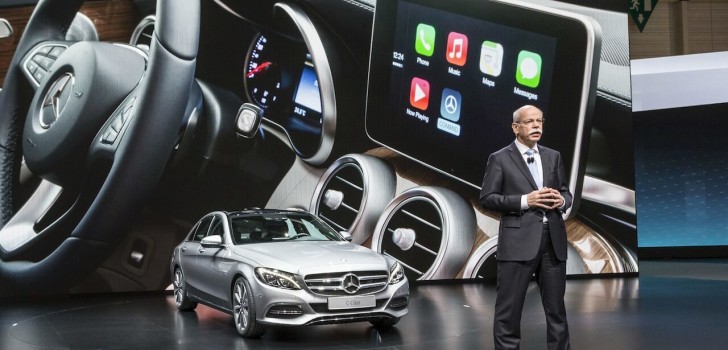Your car and phone are not going to be all the different in the near future – at least in terms of the computer systems that power them. Hot on the heels of Hyundai announcing the availability of Google’s Android on the 2015 Sonata (albeit side-loaded), GM has announced it will offer both Google’s Android and Apple’s CarPlay on all 2016 models.
“For most of us, our smartphones are essential,” said GM CEO Mary Barra in a statement. “Partnering with Apple and Google to offer CarPlay and Android Auto compatibility across the widest range of models in the industry is a great example of how Chevrolet continues to democratize technology that’s important to our customers.”
14 Chevrolet models will support the new software. Those include the 2016 Cruze compact sedan, which debuts on June 24th. The Cruze is Chevy’s best-selling passenger vehicle, with over three million sold since its inception.
Compatibility with the new systems is driven, for the moment, by screen size. GM’s Malibu, Camaro and Silverado use a seven inch display and will be compatible with both Android Auto and Apple CarPlay. The rest of the vehicles, which use an eight inch display will only be compatible with Apple CarPlay from the start of the year, with future compatibility possibly in the works.
Unlike Hyundai, which requires users to side-load the system via a multi-step process, GM’s vehicles have a simple the use interface that works with either system. An icon on its ‘MyLink’ screen appears when a phone isn’t connected, then changes status to indicate that either CarPlay or Android Auto is connected via USB. In both GM models it appears a USB connection is required while on the Hyundai, once the first setup process is completed, Bluetooth will suffice.
Android Auto requires the connected phone to run Android Lollipop 5.0 while Apple’s CarPlay requires an iPhone 5 or above.
Ford is also in the fray, having announced plans for including Android and Apple compatibility via its proprietary SYNC infotainment system. No timeline has been released however.
Ford’s SYNC system uses Blackberry’s QNX operating system, replacing the previous Microsoft platform.
While early research indicates that Apple’s CarPlay API for iPhone will dominate the car industry, with more than 24 million vehicle installs over the coming four years, the actual outcome remains to be seen.
Android is by far the most popular phone operating system and that trend looks to continue, so most manufacturers will need to support both Apple and Android.
Ford and Hyundai also show that just because vehicles will work with phones doesn’t mean Google or Apple will control the actual in-car entertainment systems. Should this happen, vehicle companies would become like Android smartphone manufacturers, where low margin hardware competes aggressively while running the same software, controlled by Google.
All manufacturers are deathly afraid to be relegated to this scenario and so will use a number of different approaches to control the in-car software, similar to Samsung using its own Tizen operating system on its TVs which is fully compatible with Apple and Google phones yet is controlled totally by the TV manufacturer.
















